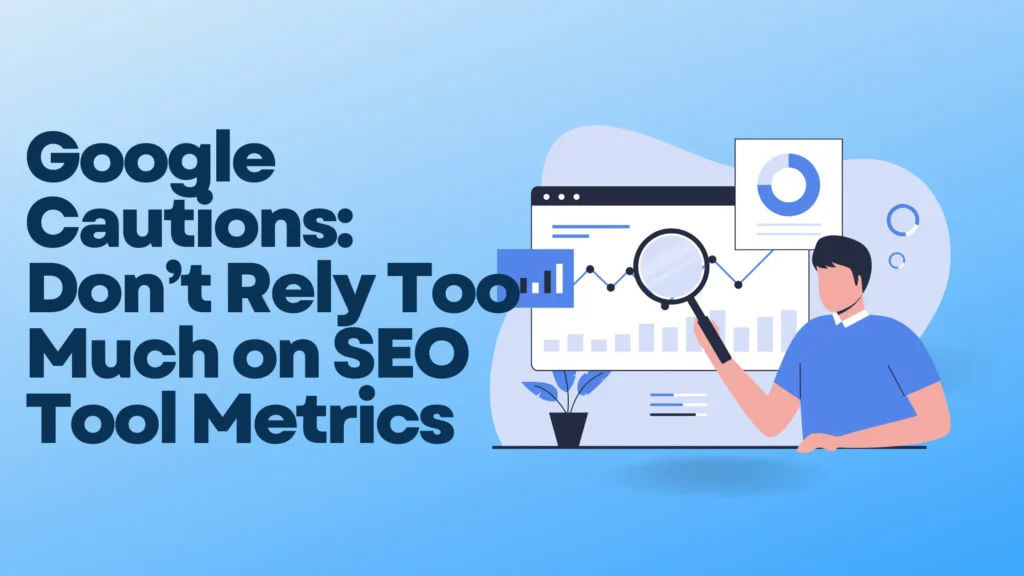In the evolving world of digital marketing, one thing remains constant: change. With constant algorithm updates and shifts in ranking factors, SEO professionals must adapt to maintain visibility and success. But amid the deluge of tools and metrics designed to help marketers stay ahead, Google has offered some crucial advice: don’t over-rely on SEO tool metrics. In this article, we’ll dive into why this warning matters, the limitations of SEO tools, and what you should focus on instead to truly thrive in the SEO landscape.

The Origins of Google’s Warning
Recently, Google’s Search Advocate, John Mueller, spoke out on Reddit’s r/SEO forum, addressing the growing concern of website owners who rely too heavily on third-party SEO tools. His warning stemmed from a discussion involving a website owner concerned about drastic changes in their Domain Authority (DA) and the perceived impact on their site’s SEO performance. Mueller’s key message was simple but powerful: focus on providing value rather than obsessing over metrics that third-party tools provide.
Metrics Vs. Reality
SEO tools such as Ahrefs, Moz, and SEMrush have their own metrics like Domain Authority, Page Authority, Spam Score, etc. These numbers are often useful for comparing websites, but they are not direct indicators of how Google perceives a site. The numbers generated by these tools are just estimates based on algorithms that do not have access to Google’s internal data. In short, they do not fully reflect Google’s assessment.
According to Mueller, relying on metrics such as DA can be misleading. Website owners may see a change in these metrics and wrongly conclude that their ranking or traffic will also change. However, the reality is that Google doesn’t use these third-party metrics when determining search engine rankings.
Common Misunderstandings
Let’s address some of the misunderstandings around these metrics that Mueller sought to clarify:
- Third-Party Tools Can’t Access Google Data: Metrics such as Domain Authority or organic visibility are derived from estimates, not from the data that powers Google’s ranking algorithm.
- Misleading Correlation: An increase or decrease in DA or any other similar score might have little to no impact on your organic rankings. These metrics don’t correlate directly with Google’s assessment of your site, nor do they predict how you will rank.
- Quick Fixes Are Often Smoke and Mirrors: Third-party tools may encourage SEO professionals to make quick fixes to boost their “scores”; however, Mueller suggests avoiding these tactics. They’re often temporary solutions that won’t have a lasting positive impact on a site’s SEO.
Why Over-Reliance on Metrics Can Be Dangerous
#1: Misplaced Focus
Relying too much on third-party SEO metrics can lead you to focus on numbers instead of quality. Instead of spending time creating unique and valuable content, some marketers obsess over tweaking their sites to increase their scores in SEO tools. This is counterproductive because Google’s algorithm rewards value, not superficial metric improvements.
#2: False Sense of Security
Having a high DA might give you a false sense of security, leading you to believe that your site is invincible in the SERPs (Search Engine Results Pages). The truth is, metrics like DA have little effect on actual Google rankings. If you’re not focusing on what actually matters — user experience, content quality, and relevancy — you risk getting outperformed by competitors who are putting the user first.
#3: Overreaction to Fluctuations
Mueller also pointed out that metrics in SEO tools can fluctuate wildly, often because of changes in how the tools collect and interpret data. These changes are normal, but they do not necessarily mean something has gone wrong with your site. Panicking over tool-driven fluctuations can lead to unnecessary and possibly harmful changes to your site.
What Really Matters in SEO
So, if we shouldn’t rely too much on SEO tool metrics, what should we focus on instead? Google has always maintained that websites that deliver the best experience to users will be the ones that rank well over the long term. Let’s break down the key areas to focus on:
1. Create Unique, Valuable Content
Content that delivers real value is more likely to succeed in Google’s rankings than content optimized for third-party metrics. Google wants content that users love, something that’s unique and irreplaceable. Mueller highlights that “unique” does not mean just putting together a unique combination of words. Instead, it refers to creating content that genuinely offers something others cannot provide.
Creating unique content is not easy, but that’s exactly what makes it so powerful. It requires research, insight, and often new perspectives. It can take time, but the payoff is worth the effort.
2. Focus on User Experience (UX)
Your website’s user experience plays a crucial role in how well it performs in search results. Elements like site speed, mobile responsiveness, ease of navigation, and accessibility all contribute to a positive user experience. Ensuring that your users find your site easy to use and navigate will lead to higher engagement rates, which are positively correlated with better rankings.
3. High-Quality Backlinks, Not Quantity
Many SEO tools report on backlinks and give insights into their perceived value. However, Mueller reiterated that not all backlinks are created equal. Google wants you to have links from high-quality, relevant sites, not just a lot of them. Link-building should be approached with quality over quantity, as spammy backlinks can end up harming your rankings.
4. Satisfy User Intent
User intent is one of the most important ranking factors today. What do users actually want when they type a particular query? Are they looking for a product, or are they just looking for information? Creating content that satisfies user intent helps you align more closely with Google’s goals, which ultimately boosts your rankings.
For example, if users are searching for “how to fix a leaking tap”, they’re not looking for a plumbing service ad. They want a step-by-step guide, ideally with visuals, to help them solve the issue themselves. Matching this intent not only satisfies the user but also gets Google’s attention.
5. Use SEO Tools as Support, Not Bible
SEO tools are fantastic for gaining insights into your site’s performance, your competition, and the keywords you’re trying to rank for. But they should be used as guides, not gospel. The metrics that these tools produce should supplement your SEO strategy, not define it.
SEO tools can help you conduct keyword research, analyze competitors, and audit your website. However, you must always balance this data against what really matters: your audience. Don’t be distracted by the pursuit of perfect numbers that hold no true meaning.
The Future of SEO: Quality Over Metrics
Mueller’s message is especially important as the SEO landscape continues to evolve. In a world where Google’s algorithm becomes more adept at recognizing genuinely valuable content, the traditional SEO game of increasing DA or chasing a particular metric becomes less and less relevant.
Search engines are getting better at recognizing which sites serve users well. They take into consideration factors such as how long users stay on your page, how often they return, and even how they interact with your content. The days when tweaking a few technical details and adding exact-match keywords could guarantee rankings are gone.
Google has consistently said that they prioritize user-first content, which is exactly why putting people above metrics is vital. Creating something valuable takes effort, but the end result will be a website that naturally attracts attention and links, ranks well, and provides a meaningful experience for its users.
Takeaways
Here are the main points to keep in mind:
- Don’t obsess over SEO tool metrics: Metrics such as Domain Authority are estimates and don’t directly correlate with Google rankings.
- Focus on value: Content should offer something unique that other websites cannot easily replicate.
- SEO tools are supportive, not definitive: They can provide helpful insights, but they are not a replacement for real SEO efforts.
- User experience matters: Ensuring your website is easy to use and navigate is more important for SEO than increasing arbitrary scores.
- Backlinks should be high-quality: Quantity is not as important as relevance and authority.
In conclusion, SEO tools are helpful companions in the journey of improving your site, but the real results come from delivering value to your audience. As Google becomes more user-centric, focusing on unique, engaging content that genuinely helps your readers will be far more beneficial than chasing tool-generated numbers. Remember, in the world of SEO, metrics may fluctuate, but genuine value never goes out of style.



